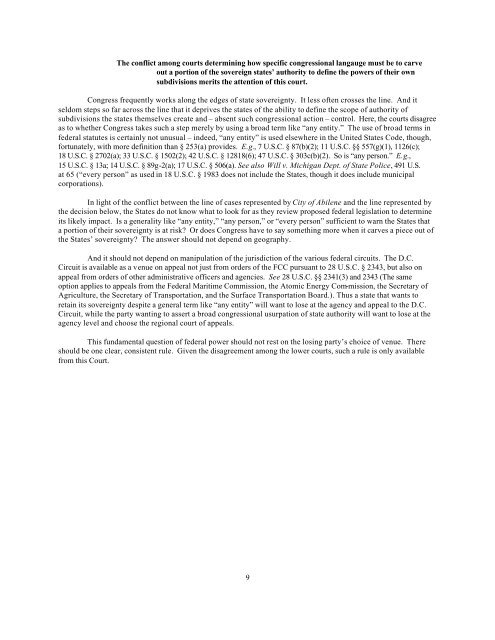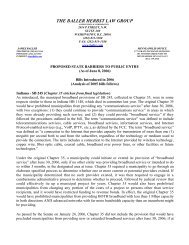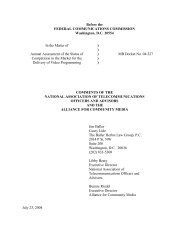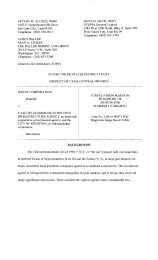Petition for Writ of Certiorari
Petition for Writ of Certiorari
Petition for Writ of Certiorari
You also want an ePaper? Increase the reach of your titles
YUMPU automatically turns print PDFs into web optimized ePapers that Google loves.
The conflict among courts determining how specific congressional langauge must be to carve<br />
out a portion <strong>of</strong> the sovereign states’ authority to define the powers <strong>of</strong> their own<br />
subdivisions merits the attention <strong>of</strong> this court.<br />
Congress frequently works along the edges <strong>of</strong> state sovereignty. It less <strong>of</strong>ten crosses the line. And it<br />
seldom steps so far across the line that it deprives the states <strong>of</strong> the ability to define the scope <strong>of</strong> authority <strong>of</strong><br />
subdivisions the states themselves create and – absent such congressional action – control. Here, the courts disagree<br />
as to whether Congress takes such a step merely by using a broad term like “any entity.” The use <strong>of</strong> broad terms in<br />
federal statutes is certainly not unusual – indeed, “any entity” is used elsewhere in the United States Code, though,<br />
<strong>for</strong>tunately, with more definition than § 253(a) provides. E.g., 7 U.S.C. § 87(b)(2); 11 U.S.C. §§ 557(g)(1), 1126(c);<br />
18 U.S.C. § 2702(a); 33 U.S.C. § 1502(2); 42 U.S.C. § 12818(6); 47 U.S.C. § 303c(b)(2). So is “any person.” E.g.,<br />
15 U.S.C. § 13a; 14 U.S.C. § 89g-2(a); 17 U.S.C. § 506(a). See also Will v. Michigan Dept. <strong>of</strong> State Police, 491 U.S.<br />
at 65 (“every person” as used in 18 U.S.C. § 1983 does not include the States, though it does include municipal<br />
corporations).<br />
In light <strong>of</strong> the conflict between the line <strong>of</strong> cases represented by City <strong>of</strong> Abilene and the line represented by<br />
the decision below, the States do not know what to look <strong>for</strong> as they review proposed federal legislation to determine<br />
its likely impact. Is a generality like “any entity,” “any person,” or “every person” sufficient to warn the States that<br />
a portion <strong>of</strong> their sovereignty is at risk? Or does Congress have to say something more when it carves a piece out <strong>of</strong><br />
the States’ sovereignty? The answer should not depend on geography.<br />
And it should not depend on manipulation <strong>of</strong> the jurisdiction <strong>of</strong> the various federal circuits. The D.C.<br />
Circuit is available as a venue on appeal not just from orders <strong>of</strong> the FCC pursuant to 28 U.S.C. § 2343, but also on<br />
appeal from orders <strong>of</strong> other administrative <strong>of</strong>ficers and agencies. See 28 U.S.C. §§ 2341(3) and 2343 (The same<br />
option applies to appeals from the Federal Maritime Commission, the Atomic Energy Com-mission, the Secretary <strong>of</strong><br />
Agriculture, the Secretary <strong>of</strong> Transportation, and the Surface Transportation Board.). Thus a state that wants to<br />
retain its sovereignty despite a general term like “any entity” will want to lose at the agency and appeal to the D.C.<br />
Circuit, while the party wanting to assert a broad congressional usurpation <strong>of</strong> state authority will want to lose at the<br />
agency level and choose the regional court <strong>of</strong> appeals.<br />
This fundamental question <strong>of</strong> federal power should not rest on the losing party’s choice <strong>of</strong> venue. There<br />
should be one clear, consistent rule. Given the disagreement among the lower courts, such a rule is only available<br />
from this Court.<br />
9






